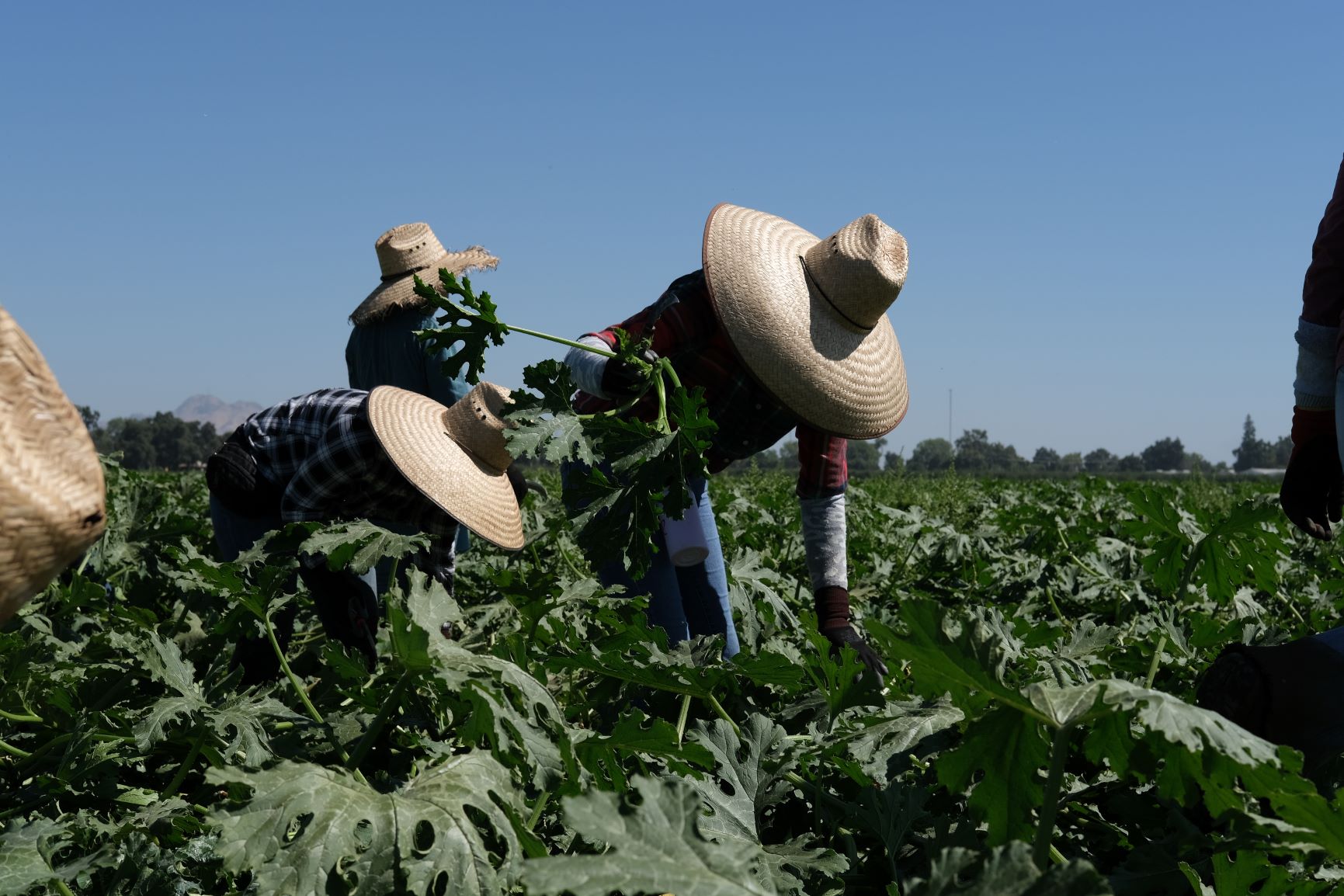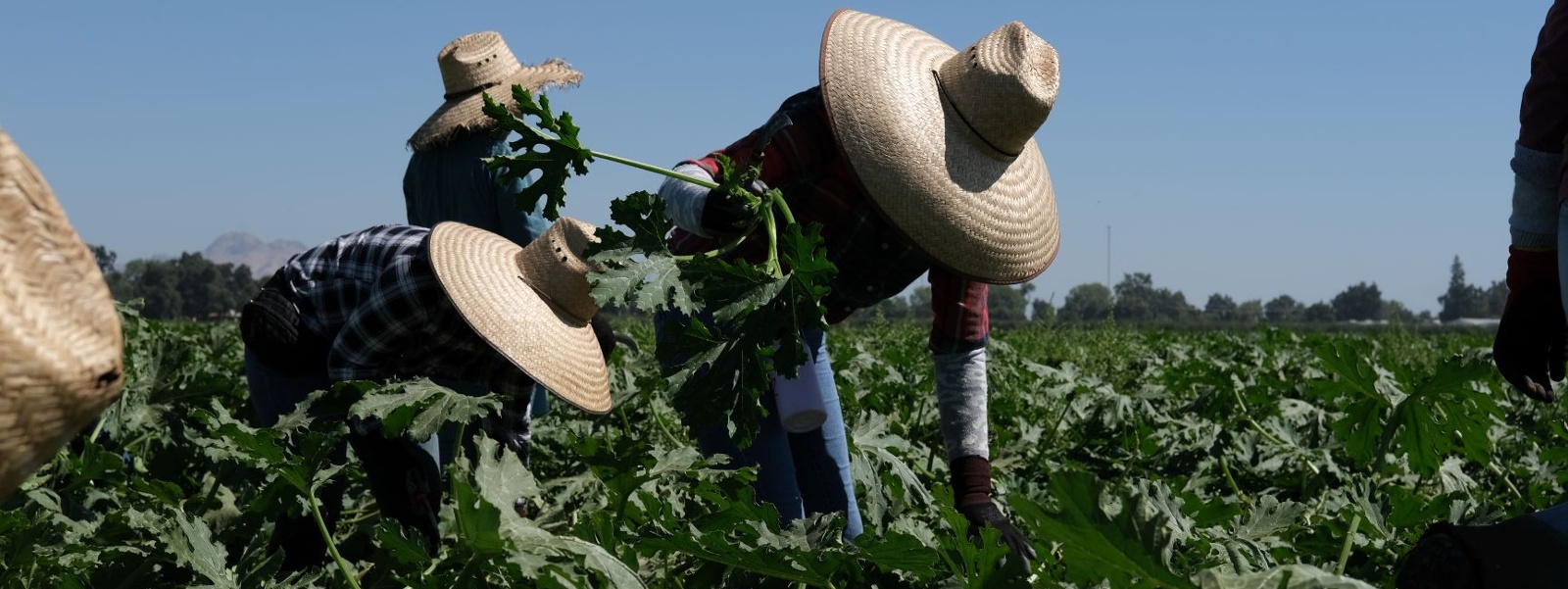Controversy trails labor union wins under card check

California’s new farm labor organizing law, commonly called “card check,” allows workers to unionize by signing authorization cards instead of voting in secret-ballot elections. The law has generated controversy, with labor unions and employers each accusing the other of coercing farmworkers.
Photo/Caleb Hampton

By Caleb Hampton
California’s new farm labor organizing law has in recent months delivered a series of union wins and a string of competing allegations from employers, farmworkers and labor organizers.
In March, Wonderful Nurseries, the nation’s largest grapevine nursery, claimed United Farm Workers organizers tricked more than a hundred of its workers into unwittingly signing union authorization cards. UFW denied wrongdoing and responded with counter charges against the company.
The dispute, pitting the farmworker union against California’s wealthiest farming family, prompted a weekslong hearing before the California Agricultural Labor Relations Board and brought questions about the law into the national spotlight.
At issue is the process farmworkers are given to join or reject a labor union. Assembly Bill 113, which was enacted last May, replaced secret-ballot union elections with a system commonly called “card check.” It amended similar legislation, AB 2183, which took effect Jan. 1, 2023. The law sunsets in 2028.
Previously, to unionize, more than half of a company’s workforce needed to sign a petition to trigger a secret-ballot election organized by the ALRB, typically at a farm work site or a nearby venue. More than half the workers then needed to vote in favor of unionizing. Under card check, a farm is unionized when more than half its employees sign authorization cards with a labor union, with no election taking place.
Farmworkers’ right to a secret ballot was a cornerstone of the UFW’s platform during the labor movement half a century ago. But in recent decades, the union’s membership dwindled from 80,000 farmworkers to around 5,000, less than 2% of California’s farm workforce. It had not won a union election since 2017.
Farmworker advocates and labor groups argued intimidation and voter suppression during in-person elections was preventing farmworkers from unionizing. As a remedy, card check was proposed.
Within the past six months, employees at four California farms, totaling more than 1,100 workers, have unionized through the new law under the UFW.
“They’re off to the races,” said Bryan Little, director of labor affairs at the California Farm Bureau and chief operating officer of Farm Employers Labor Service.
Employer advocates have criticized the law, arguing it allows union organizers to pressure or entice workers to sign cards while making it impossible to revoke them. They have also complained that under card check, employee signatures are valid for one year, during which time workers’ views on unionizing may change, especially if they move from one employer to another.
“That’s the value of the secret-ballot election,” Little said. In the days leading up to the vote, he said, both the employer and the union had the opportunity to speak with employees. “With card check, that give-and-take never happens,” he said. “There’s nobody talking to the employees other than the union.”
In November, DiMare Fresh, also called DMB Packing Corp., became the first farm unionized through card check. The Stanislaus County tomato grower-shipper disputed the certification, alleging organizers bribed and harassed some of its 297 workers into signing cards. The ALRB, the state agency that administers agricultural labor laws, determined the company’s claims lacked evidence.
In January, workers unionized at Olive Hill Greenhouses, a San Diego County nursery with around 80 employees. In March, workers unionized at Ho Sai Gai Farms, a Kern County vegetable grower-shipper with 114 employees.
The ALRB has proposed rules for implementing card check that would require a signed authorization card list the employer to which the card pertains. But the proposed rules state explicitly that the card “may not be revoked.”
Last month, California Farm Bureau and other farm groups submitted comments to the ALRB requesting that it allow workers to revoke their cards.
“These are valid questions that are going to have to be resolved,” said Philip Martin, professor emeritus at the University of California, Davis, and expert on farm labor.
Controversy around the law has crystalized in the ongoing dispute between UFW and Wonderful Nurseries. Last year, according to workers at the Kern County nursery, UFW organizers held meetings in local homes and churches to educate Wonderful Nurseries employees about the union and collect signatures.
During the meetings, according to the reports, organizers also helped workers apply through an online portal for one-time pandemic-relief payments of $600 from the U.S. Department of Agriculture. The USDA awarded grants to 14 nonprofit organizations, including the UFW Foundation, to disperse the funds to eligible workers.
In February, UFW submitted cards to the ALRB signed by 327 of Wonderful Nurseries’ 640 employees. Within days, the company contested the union petition, saying UFW had defrauded its workers. The nursery handed over sworn declarations from 148 employees who said they were tricked into signing the cards and wanted to revoke them.
In one declaration, a nursery employee described a meeting at a co-worker’s house organized by UFW Vice President Erika Navarrete. “She had me sign a white card with an eagle and told me to sign a piece of paper. She told me this was part of the process to apply for the $600, but she never explained to me or the others that this was part of the union,” the worker said. “They lied to us.”
Dozens of declarations reviewed by Ag Alert®, with employee names redacted, gave similar accounts. “All of it was ignored by the labor board whose very job it is to ensure an honest process,” Wonderful Nurseries President Rob Yraceburu said in a statement.
The ALRB called the allegations “serious in nature,” but it certified the union, triggering the start of a 90-day window to negotiate a contract. The board said the claims would be examined at an investigative hearing.
Since then, Wonderful Nurseries employees have walked off the job to attend demonstrations outside the ALRB’s office in Visalia and outside the Marriott hotel and convention center in Bakersfield, where the hearing has entered its third week. They carried placards and chanted in Spanish, “We don’t want a union.”
Wonderful Nurseries is part of the Wonderful Co. farming empire owned by billionaire philanthropists Lynda and Stewart Resnick. The family has donated more than half a billion dollars for programs and infrastructure in the Central Valley and has built schools that serve some of their employees’ children.
“Our company’s history of working with agricultural workers is rooted in mutual trust, collaboration and respect,” Yraceburu said. “We will use every legal and regulatory option at our disposal to do what the UFW and labor board seem only to purport to do, which is to protect workers.”
UFW called the allegations against it “categorically false” and characterized farmworkers’ objections as the result of a pressure campaign by Wonderful Nurseries. Over the past two months, the union filed five unfair labor practice charges against the company. “The employer is attempting to overturn the certification workers earned with a campaign of lies and intimidation, denying workers the opportunity to bargain in good faith for the benefits and improvements that come with a union contract,” Navarrete said in a statement.
UFW contracts typically include health coverage and a “for cause” termination clause, among other components.
On April 22, the day before the hearing began, ALRB General Counsel Julia Montgomery filed a complaint against Wonderful Nurseries.
In the days after UFW filed to represent Wonderful Nurseries employees, Montgomery said, the nursery stopped work to bring employees into meetings where they were told the company opposed them joining a union. The complaint said the employer told workers that UFW would deduct $200 from each paycheck (union dues are typically 3%) and that, if they had mistakenly signed authorization cards, the company could help them revoke the cards.
Employees were later invited into a conference room, according to Montgomery, where a team of lawyers and human resources personnel worked with them to prepare the declarations saying they were tricked into signing cards.
Wonderful Nurseries has maintained it was within its rights to educate and support workers who approached the company with questions after learning they had joined a union.
Last year, the National Council of Agricultural Employers reported to the USDA allegations of a “nearly identical” scheme involving pandemic-relief funds by UFW organizers in New York, which passed a card check law for farmworkers in 2019. NCAE, citing Wonderful Nurseries’ allegations, has called for a federal investigation into UFW’s use of the funds.
As the ALRB hears witness testimony in Bakersfield, UFW stands to suffer a loss of credibility if found to have deceived workers. Meanwhile, Wonderful Nurseries could be subject to financial penalties if the agency rules it committed labor violations.
(Caleb Hampton is an assistant editor of Ag Alert. He may be contacted at champton@cfbf.com.)




